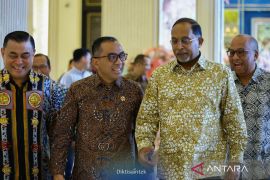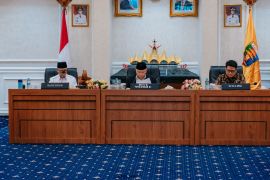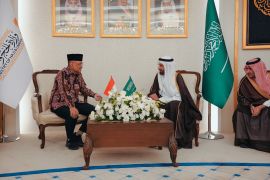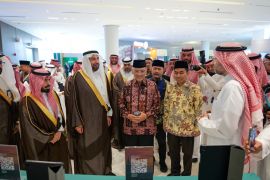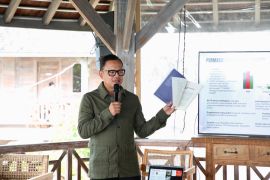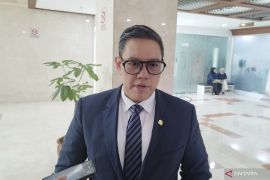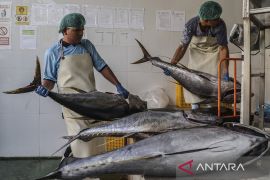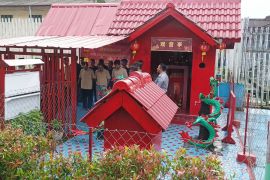Since the two nations declared a strategic partnership in Jakarta in 2005, China and Indonesia have been witnessing rapid growth in bilateral trade and economic ties.
The two-way trade volume in 2011 reached US$60.5 billion, an increase of around 42 percent from US$42.7 billion in 2010.
According to the Chinese government`s data, its exports to Indonesia last year reached US$29.2 billion, while its imports from Indonesia were US$31.3 billion, or a deficit of about US$2 billion for China.
"The bilateral trade and economic relations have been growing tremendously," Liang Wentao, the Deputy Director-General for Asian Affairs at the Chinese Ministry of Commerce, said in Beijing recently.
The Indonesian government`s data, however, records the two countries` two-way trade at around US$50 billion, with Indonesia having a deficit of around US$2 billion.
China is Indonesia`s second largest trade partner after Japan, Indonesian Ambassador to China, Imran Cotan, said in Beijing on March 14.
The disparity in data on trade between Indonesia and China attracted the attention of President Susilo Bambang Yudhoyono on a state visit to China, from March 22-24.
Yudhoyono said the difference has possibly occurred due to some goods being exported through unofficial means. "A lot of Indonesian goods have been exported through a neighboring country. That is a form of treason," he said.
He instructed the trade ministry and other government agencies to bring order to trade between Indonesia and China.
Referring to those responsible for under-reporting trade volumes, the President said, "If they have violated the regulations, they should just be fired. There is no need to counsel them," he noted in Beijing on March 24, on the sidelines of his state visit.
The head of state also asked Trade Minister Gita Wirjawan to investigate the case and take action against anyone involved in it.
Trade was one of the main pillars in Indonesia`s cooperation with China. Besides trade, the two countries also agreed to strengthen cooperation in the fields of industry, human resource development and energy.
To further strengthen the already sound bilateral relations, Indonesia and China have agreed to revive a joint commission.
"The joint commission will be directly responsible to the president," President Yudhoyono said on the sidelines of the state-visit.
The joint commission will evaluate the existing relations and find opportunities to expand cooperation between the two countries.
It will also deal with a number of sectors, including trade, investment, agriculture, tourism, energy, defense, and foreign relations.
President Yudhoyono and his counterpart Hu Jintao signed cooperation agreements valued at US$17.4 billion, on March 23 in Beijing.
"The cooperation has been agreed upon in 15 Memorandums of Understanding. The sectors in which cooperation have been established include seaports, roads, alternative energy, the motorcycle industry, mining, construction in strategic areas and the Sunda Strait Bridge, plantations, tourism, and the steel industry," said Yudhoyono.
Indonesia and China initially agreed to increase the two-way trade volume to US$50 billion by 2014. In fact, in 2011, the figure had exceeded to US$60 billion, according to Ambassador Imran.
Therefore, both countries later set a target of US$80 billion in two-way trade by 2015.
"I am optimistic that we will achieve the target," Imran said, adding that his embassy organizes a monthly TTI (trade, tourism and investment) forum in several Chinese big cities in order to promote Indonesia`s business opportunities and help meet the trade target.
Another important point is that both China and Indonesia are eager to balance their two-way trade volume, as expressed by the two countries` officials.
"Our trade is healthy and mostly balanced", he added, hoping that one day Indonesia will become China`s number one trade partner.
Liang also hoped that China`s imports from Indonesia were sustainable and balanced. "Too much trade surplus creates more burden than wealth," he noted.
He assured that the Chinese government has continuously encouraged its businesspersons to trade and invest in Indonesia, which is politically stable, rich in natural and human resources, and geographically close to China.
The Chinese official also stated that his government attaches great importance to Indonesia as the biggest nation in ASEAN and a member of G20. Both countries are eager to develop mutually beneficial and forward-looking economic ties, he said.
The feeling seems to be mutual. For Indonesia, Ambassador Imran Cotan said, China, as one of the world`s economic giants, is an opportunity and not a challenge.
"China is like a beautiful, rich lady, and everybody wants to become a friend of China," he remarked. (*)
(F001/INE/B003) 27-03-2012 17:07:22
Reporter: Fardah
Editor: Fardah Assegaf
Copyright © ANTARA 2012

